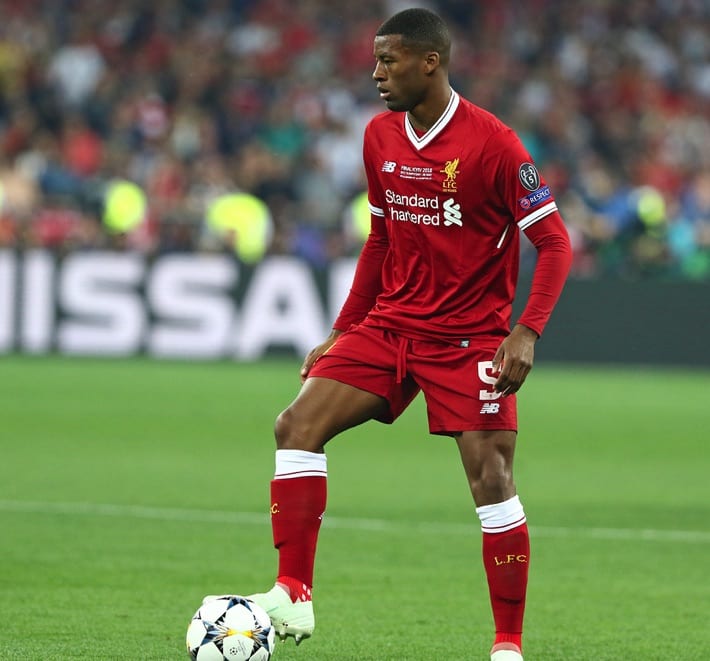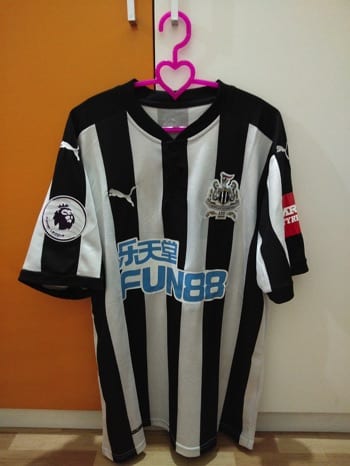
There has always been a relationship between gambling and sport, with some sports having a more closely aligned one than others. Horse racing, for example, depends on gambling to such an extent that if that relationship was disrupted it would have serious and lasting consequences for the sport. Don’t forget the first legal bookmakers were on-course ones.
The same is not necessarily true of football. Such is the money swirling around the sport that if there was no link to gambling it almost certainly wouldn’t be overly affected. Yet there is an undeniable relationship between football and gambling, which is evidenced in the number of clubs that have shirt sponsorship deals with betting companies. Here’s a closer look at the topic.
A Brief History of Shirt Sponsorship
There was a time when football somehow saw itself as ‘purer’ than other sports. The commercialism that is rampant nowadays was virtually unheard of and, in many cases, actively rejected. That wasn’t the case at Rockingham Road in Kettering, however. The then-Southern League club made a deal on the 24th of January 1976 to have its shirts sponsored.
The deal was done between Kettering Town and Kettering Tyres, with the company’s logo being emblazoned on the club shirts for their match with Bath City. It was the result of a ‘four-figure’ agreement that had been pushed by Kettering’s new Chief Executive Derek Dougan, who had been appointed a month or so before. The Football Association wasn’t impressed.
The FA moved to have the slogans removed on account of the fact that sponsorship had been declared against the rules in 1972. Dougan responded by changing it to say ‘Kettering T’, claiming the T stood for Town, but the FA ordered it to be removed completely or the club would be issued with a £1,000 fine. Kettering eventually relented.
Kettering soon went to work on getting the Association to change its mind, teaming up with Bolton Wanderers and Derby County to have shirt sponsorship allowed. The ruling body eventually chose to do just that in June of 1977, lifting the ban but limiting the size of sponsors’ names.
The tide turned completely in 1979 when Liverpool, one of the most successful teams ever, signed a sponsorship deal with the Japanese electronic company Hitachi. It lasted until 1982 and many people believe that the club was the first the sign a sponsorship deal, presumably because of their success in comparison to Kettering Town. By 1987, all league clubs had shirt sponsors.
Modern Shirt Sponsorship Deals

It is fair to say that sponsorship deals have changed immeasurably in the days since Hitachi agreed to sponsor Liverpool for £100,000 over two years. Nowadays, deals are worth tens of millions of pounds to the clubs that take on the sponsorships, which is why so many shop around for the best deals regardless of the type of company that they make the agreements with.
It might have taken a well for it to become common practice in the 1980s, but in the modern game, there are no clubs in the English Football League that don’t have a shirt sponsor of one form or another. Here’s a look at the shirt sponsors of every Premier League club for the 2019-2020 season, with yearly worth, to give you an idea of the scale of sponsorship:
- AFC Bournemouth – M88 – £5 million
- Arsenal – Emirates – £40 million
- Aston Villa – W88 – £6 million
- Burnley – LoveBet – £7.5 million
- Brighton & Hove Albion – American Express – £1.5 million
- Chelsea – Yokohama Tyres – £40 million
- Crystal Palace – ManBet X – £6.5 million
- Everton – SportPesa – £9.6 million
- Leicester City – King Power – £4 million
- Liverpool – Standard Chartered – £40 million
- Manchester City – Etihad Airways – £45 million
- Manchester United – Chevrolet – £64 million
- Newcastle United – Fun88 – £6.5 million
- Norwich City – Dafabet – £3 million
- Sheffield United – Union Standard Group – £3.5 million
- Southampton – LD Sports – £7.5 million
- Tottenham Hotspur – AIA – £35 million
- Watford – SportsBet – £6.5 million
- West Ham United – Betway – £10 million
- Wolverhampton Wanderers – ManBet X – £8 million
It’s interesting to note that the biggest deals aren’t actually those involving bookmakers, with Manchester United standing out at the top thanks to their £64 million per year deal with Chevrolet. That being said, it’s also noteworthy that the club’s with the biggest deals are also amongst the best-known clubs in the world. It’s easier to get larger sponsorship if you’re well-known.
The first club on the list to have a sponsorship deal worth talking about from a betting company is West Ham United, who have a £10 million per year deal with Betway. That is nearly a quarter of the value of Tottenham’s £35 million deal with the insurance group AIA. The lowest deal in the 2019-2020 season was Brighton’s £1.5 million per year from American Express.
Football Clubs & Betting Companies
The number of sponsorships from betting companies has risen exponentially for football clubs. One of the most obvious examples of a football club that has a close relationship with a gambling firm is Stoke City, which has been sponsored by Bet365 since 2012. That’s because the club is owned by the Coates family, who are also behind the betting company.
At the time, sponsorship by betting companies was decidedly rare, but in the years that followed, it was almost as if the dam had broken. By 2013-2014, three clubs in the English top-flight had gambling sponsors, with that figure growing year-on-year until 50% of Premier League sides had a betting sponsor by the start of the 2019-2020 campaign.
Here’s a look at how things changed over the years for the English top-flight:
| Season | Count | Clubs with Gambling Sponsors | Percentage of Top-Flight Teams |
|---|---|---|---|
| 2013-2014 | 3 | Aston Villa, Fulham, Stoke City | 15% |
| 2014-2015 | 5 | Aston Villa, Burnley, Hull City, Stoke City, West Ham United | 25% |
| 2015-2016 | 7 | Bournemouth, Crystal Palace, Stoke City, Sunderland, Watford, West Bromwich Albion, West Ham United | 35% |
| 2016-2017 | 10 | Bournemouth, Burnley, Crystal Palace, Hull City, Stoke City, Sunderland, Swansea City, Watford, West Bromwich Albion, West Ham United | 50% |
| 2017-2018 | 9 | Bournemouth, Burnley, Crystal Palace, Everton, Huddersfield Town, Newcastle United, Stoke City, Swansea City, West Ham United | 45% |
| 2018-2019 | 9 | Bournemouth, Burnley, Crystal Palace, Hull City, Fulham, Huddersfield Town, Newcastle United, West Ham United, Wolverhampton Wanderers | 45% |
| 2019-2020 | 10 | Aston Villa, Bournemouth, Burnley, Crystal Palace, Everton, Newcastle United, Norwich City, Watford, West Ham United, Wolverhampton Wanderers | 50% |
The particularly interesting thing to note as the seasons progress is the number of times that a promoted team came back to Premier League bearing the name of a gambling sponsor. It is suggestive of an over-dependence on gambling companies for teams lower down the English Football League.
The Lower Leagues
The issue of gambling companies sponsoring Premier League clubs is a noteworthy one because it is the most visible league in the country, if not the world. Yet it certainly doesn’t boast the monopoly when it comes to sponsorship deals from betting firms. Indeed, the problem, if it is to be a classed as a problem, is even more prevalent with lower league sides.
In November of 2019, for example, there was much consternation from non-league football supporters when it was announced that BetVictor would be the main sponsor for the Southern League, the Northern League and the Isthmian League. Whilst obviously not a shirt sponsor, it shows the depth of gambling sponsors lower down the footballing pyramid.
The English top-flight might well have been ahead of the curve of the rest of the footballing pyramid when it came to getting the first gambling sponsor, but in the years that followed, the rest of the Football League has very much taken over. For the 2018-2019 season, as an example, 17 of the 24 Championship clubs had gambling sponsors.
Is It An Issue?
The key question in all of this is whether or not it’s actually a problem for gambling to be such a large part of the footballing world. On the one hand, the majority of people who are going to have a flutter will do so regardless of whether a shirt bears the name of a betting company. On the other hand, problem gambling is becoming an issue for society at large nowadays.
With around 60% of the clubs across the Premier League and Championship being sponsored by betting firms, experts believe that it is ‘disturbing’ and ‘worrying’. For Professor Jim Orford of Gambling Watch UK, it is the ‘normalisation’ of betting, especially for young people, that is such a large cause for concern, with more 400,000 people being ‘problem gamblers’.
Researchers into the matter believe that the rise in betting companies sponsoring football shirts is a ‘public health concern’. With 50% of players in the top-flight bearing gambling company logos, that’s a large portion of the watching-world exposed to something that many believe is harmful. The combination with app-driven content then makes gambling more likely.
There are also countless stories of people who have become so embroiled in the world of gambling that they see no way out for themselves other than taking their own lives. The charity Gambling With Lives has been setup by parents and relatives of those who have become too overwhelmed by their addiction to know how to escape.
It Looks Like Slowing Down

At the time of writing, it seems as though the tide is turning against betting companies when it comes to their sponsorship of football clubs. There was widespread condemnation of the deal between 32Red and Derby County, for example, when it was revealed that the Rams would have a sponsorship deal with them and sign Wayne Rooney to wear the number 32 shirt.
GVC Holdings, which is the parent company of betting firms, such as Ladbrokes and Coral, has actually led the call for betting sponsors on football shirts to be banned. It would mean that the Premier League would then come in line with Italy and Germany, where betting sponsorship is already restricted.
That being said, it is difficult to see a world in which football and gambling will part from each other without being forced to do so. Global Betting and Gaming Consultants believe that the Gross Gambling Yield amount provided by football rose from £908.5 million in 2016 to £1.4 billion in 2018, so it’s easy to understand why they’ll be reluctant to kill the golden goose.
Ultimately, though, it might not be up to the sport or the industry to make such decisions. The British government is seemingly determined to have another look at gambling legislation in an attempt to update the 2005 Gambling Act, which may well include the tightening of restrictions around betting companies and their branding in football.
Of course, there is always the chance that the betting industry might jump before it is pushed. In 2019, it took a decision to introduce a whistle-to-whistle ban on gambling adverts on television before the watershed, so it’s not out of the question that a similar such self-imposed ban on shirt sponsorship, as well as pitchside advertising, can be introduced voluntarily before it’s forced on them.